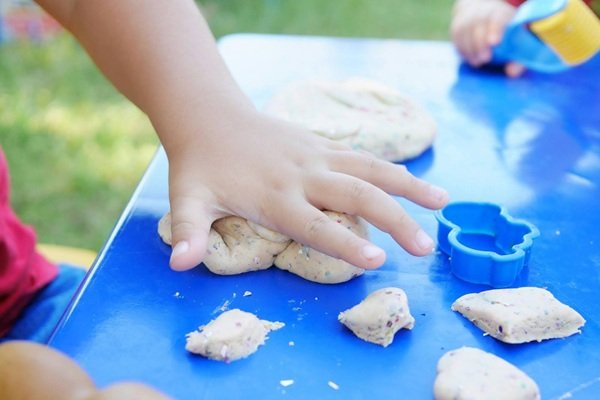Last Updated on June 20, 2025 by Emma
Purposeful ways to connect, grow, and make this summer truly meaningful.
Summer has a way of sneaking up and slipping by. One minute, it’s the last day of school, and the next, it’s back-to-school shopping and wondering where the time went. Between camps, playdates, and pool trips, the weeks can feel full but not always fulfilling.
That’s why we’ve leaned more into the idea of intentional parenting—choosing to use the sun-soaked season to create deeper connections, instill life skills, and build habits that last well beyond August.
This summer, build yourself a bucket list that blends fun and purpose. Whether you’re a planner or a go-with-the-flow type, I hope this list helps you soak up summer in a way that feels truly meaningful.
Plan a Weekly Family Adventure (Big Or Small)

One of the best things we’ve done as a family is start a tradition of planning one intentional outing every week during the summer. It sounds like a lot, especially when you’re juggling work, camps, and the general chaos of summer life, but it doesn’t have to be big, expensive, or Instagram-worthy. It just has to be intentional.
Your adventure can be anything from a Saturday morning farmer’s market to a sunset walk around your neighborhood. Maybe one week it’s hiking a new trail, and the next, it’s a picnic in the park. It’s not about what you do, but rather that you do it together, without distractions.
To make it even more fun for the kids, give them ownership in planning the process. Let them take turns picking the destination or activity, and have them help pack the snacks or set the budget.
This tradition is a great way to break up the summer routine, but it’s also a gentle reminder for us as parents: we don’t need extravagant plans to create memories.
Start a Summer Learning Challenge

Yes, summer is supposed to be a break, but that doesn’t mean learning has to stop completely. A summer learning challenge can help keep young minds engaged and curious.
One simple way to do this is by creating a “Summer Passport” where your kids earn stamps for completing activities like reading books, conducting simple science experiments, or learning a new skill. The format can be tailored to fit any age or interest and doesn’t require anything fancy.
When they hit their goal, give them a reward like a trip to the bookstore or an ice cream date.
Schedule a No-Screens Day Every Week

With screens woven into nearly every aspect of daily life, designating a weekly no-screens day can help reset habits and encourage more meaningful connections.
Instead of digital entertainment, encourage your kids to explore more hands-on activities. Board games, scavenger hunts, water balloon battles, or crafting are great screen-free activities to keep your kids entertained.
These screen-free days also offer adults the chance to model intentional tech boundaries. Setting phones aside and engaging fully in the moment communicates that time together is a priority. Over time, families often notice a shift—more laughter, more conversation, and a stronger sense of connection.
Involve Kids In Meal Planning and Cooking

If your kitchen is anything like mine in the summer, it’s a revolving door of snacks, half-eaten popsicles, and someone asking “what’s for dinner” even though they just ate lunch.
We started involving the kids in meal planning and cooking, and it’s turned into one of our favorite summer routines.
Each week, we sit down together and plan out a few meals. I let the kids pick one recipe each—with gentle guidance, of course. Then, we look through the pantry, make a shopping list, and head to the store together.
In the kitchen, they help with age-appropriate tasks: washing veggies, measuring ingredients, stirring sauces, or setting the table. Yes, it takes longer. Yes, it’s messier. But they love it.
Build Savings Goals Together

If there’s one thing summer offers—besides endless laundry and sticky countertops—it’s the perfect opportunity to talk to your kids about money. With fewer schedules to juggle and more downtime to chat, we’ve started baking in simple lessons about spending, saving, and planning ahead.
Each of our kids picked something they want by the end of summer. We help them figure out the total cost, break it down into weekly goals, and create a visual tracker—just a printed thermometer chart they can color in with each dollar they earn from their chores. Suddenly, they’ll feel ownership over their goals and feel excited about working toward them.
This summer, we also sat down and talked about what we’re saving for them. Whether they intend to use it for college, their first car, or even something like starting a business one day, we wanted them to know we’re thinking about their future too.
While there are lots of options for accounts to save money for your kids, we opted to open a UGMA account for each kiddo. If you aren’t familiar, it’s a custodial account where you can start saving and investing on your child’s behalf. The money can be used for major milestones in adulthood once they reach the age at which they take control of the account. While we don’t dive into the nitty-gritty with our kids just yet, we do talk about the bigger picture: saving now, little by little, builds something meaningful over time.
Your child may not remember every dollar they earned or every chart they filled in, but they will remember how it felt to set a goal, work for it, and have your support every step of the way.
Plan For Rest and Mindfulness

Summer can be just as exhausting as it is fun. Building in moments of rest and mindfulness is essential. Purposeful downtime can help your kiddos regulate emotions, recharge their energy, and develop a healthier relationship with business.
Mindfulness practices can be introduced easily in age-appropriate ways. Try incorporating simple breathing exercises before bed, stretching together in the mornings, or using guided meditations designed for kids. These small habits help children learn to recognize their feelings, reduce stress, and build self-awareness.
Another gentle mindfulness activity is starting a gratitude jar. Each day, write down something that brought joy, peace, or pride and drop it in. Reading through these notes at the end of the week or month creates a ritual of reflection and positivity, reinforcing emotional well-being.
Even a short daily check-in—such as asking “What made you feel proud today?”—can open up meaningful dialogue and help kids reflect on their emotions and accomplishments. These quiet, intentional moments often become just as memorable as the big adventures.
As parents, we all feel the pressure to make every summer magical. But kids don’t need a nonstop lineup of big plans to feel loved or inspired—they need connection, intention, and a little room to explore who they’re becoming.
By weaving in purpose alongside play, you can turn ordinary days into meaningful ones. A simple picnic becomes a lesson in planning. A no-screen afternoon becomes a space for creativity. So as the weeks unfold, come back to this bucket list when the days start to blur or the routines feel a little too loose. Use it as a reminder that intention is what will make your summer memories unforgettable.

